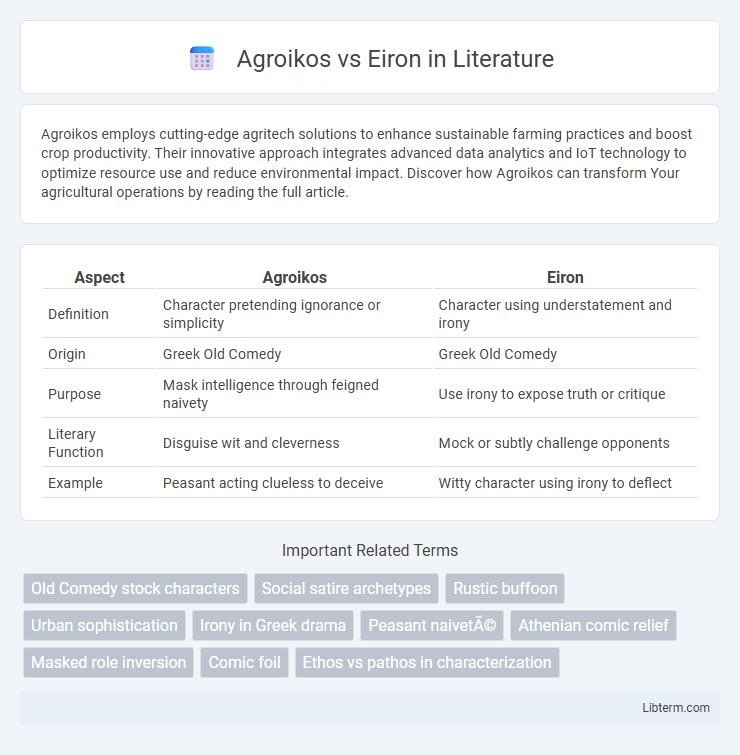Agroikos employs cutting-edge agritech solutions to enhance sustainable farming practices and boost crop productivity. Their innovative approach integrates advanced data analytics and IoT technology to optimize resource use and reduce environmental impact. Discover how Agroikos can transform Your agricultural operations by reading the full article.
Table of Comparison
| Aspect | Agroikos | Eiron |
|---|---|---|
| Definition | Character pretending ignorance or simplicity | Character using understatement and irony |
| Origin | Greek Old Comedy | Greek Old Comedy |
| Purpose | Mask intelligence through feigned naivety | Use irony to expose truth or critique |
| Literary Function | Disguise wit and cleverness | Mock or subtly challenge opponents |
| Example | Peasant acting clueless to deceive | Witty character using irony to deflect |
Introduction to Agroikos and Eiron
Agroikos is an innovative financial technology company specializing in advanced credit risk assessment models utilizing artificial intelligence and big data analytics. Eiron operates as a prominent financial service provider offering tailored lending solutions and risk management tools to small and medium-sized enterprises. Both companies drive transformation in financial services through technology-driven strategies aimed at improving credit decision accuracy and operational efficiency.
Origins and Etymology of Agroikos and Eiron
Agroikos originates from the ancient Greek word agroikos, meaning "rural" or "rustic," often used to describe someone from the countryside with a lack of sophistication or urban manners. Eiron, derived from the Greek eron, refers to a character who uses self-deprecation and understatement to mask their true capabilities or intentions, often appearing modest or naive. The contrast between Agroikos and Eiron highlights differing social and rhetorical roles: Agroikos embodies rustic ignorance, while Eiron represents cunning humility.
Character Traits: Agroikos vs. Eiron
Agroikos embodies a rustic, straightforward character marked by bluntness, simplicity, and naivety, often lacking refinement or social polish. Eiron, in contrast, displays cunning, subtlety, and verbal dexterity, using understatement and irony to mask true intentions and outwit opponents. The stark contrast between Agroikos' honest bluntness and Eiron's strategic deception defines their roles in classical Greek drama and comedy.
Literary Depictions Through History
Agroikos and Eiron are archetypal stock characters originating from ancient Greek comedy, representing the rustic, clumsy country bumpkin and the witty, deceptive urbanite, respectively. Literary depictions of Agroikos emphasize his naivety and simplicity, often highlighting the cultural divide between rural innocence and city sophistication. In contrast, Eiron cleverly manipulates situations with irony and verbal subtlety, serving as a vehicle for social satire in classical and Elizabethan drama.
Cultural Symbolism and Social Roles
Agroikos symbolizes rustic ignorance and uncultivated manners, often portrayed as a rural outsider embodying simplicity and directness, contrasting with Eiron's role as a clever, self-deprecating urban figure who uses irony and understatement to navigate social hierarchies. The Agroikos often represents the unfamiliar or uncultured in city settings, highlighting themes of naivety and social awkwardness, while the Eiron leverages wit and ambiguity to subvert expectations and assert control within complex social interactions. Their opposing cultural symbolism underscores broader social dynamics of power, identity, and class distinction in classical literature and drama.
The Agroikos Archetype in Comedy
The Agroikos archetype, rooted in ancient Greek comedy, embodies the unsophisticated rustic often portrayed as naive or gullible, serving as a foil to city dwellers' wit and sophistication. This character contrasts with the Eiron archetype, who uses subtle irony and cunning to navigate social situations, highlighting the tension between rural simplicity and urban cleverness in comedic narratives. Understanding the Agroikos archetype reveals how humor in classical theater critiques social hierarchies and cultural values through exaggerated character traits.
The Eiron as the Clever Understater
The Eiron archetype in classical literature is characterized by clever understatement and strategic self-deprecation, contrasting sharply with the boastful Agroikos. This figure employs irony and subtlety to navigate social situations, often revealing truth through what is left unsaid or downplayed. Such nuanced communication highlights intellectual wit and social insight, making the Eiron a master of indirect persuasion.
Comparative Analysis in Ancient Greek Literature
Agroikos and Eiron are contrasting stock characters in Ancient Greek literature, embodying rural naivety and urban cunning respectively. Agroikos represents the unsophisticated, gullible farmer often duped by clever city dwellers, whereas Eiron is characterized by self-deprecating irony and strategic understatement to outwit opponents. Their interplay in classical works like Aristophanes' comedies highlights social tensions between rustic ignorance and sophisticated wit, underscoring themes of deception and intelligence in Athenian society.
Influence on Modern Characterization
Agroikos, embodying rustic simplicity and roughness, serves as a foundational archetype in modern characterization to portray unrefined or unsophisticated rural characters. Eiron, characterized by understatement and ironic self-deprecation, influences contemporary figures who use wit and subtlety to navigate social dynamics. The contrast between Agroikos and Eiron enriches modern narratives by highlighting diverse approaches to authenticity and social interaction in character development.
Conclusion: Relevance of Agroikos and Eiron Today
Agroikos and Eiron remain highly relevant in contemporary discourse, symbolizing two distinct approaches to humility and irony in communication. Agroikos represents straightforward sincerity and rustic honesty, while Eiron embodies subtle self-deprecation and strategic understatement. Understanding these archetypes enhances interpretations of rhetoric, literature, and social interactions in today's complex cultural landscape.
Agroikos Infographic

 libterm.com
libterm.com